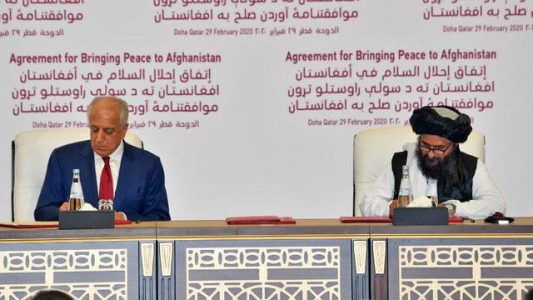
Afghan president orders the release of 1500 Taliban prisoners
Afghan President Ashraf Ghani has issued a decree to release Taliban prisoners ahead of talks between the insurgents and the Afghan government, his spokesman said Tuesday, potentially removing an obstacle to implementing the U.S.-Taliban deal.
“President Ghani has signed the decree that would facilitate the release of the Taliban prisoners in accordance with an accepted framework for the start of negotiation between the Taliban and the Afghan government,” spokesman Sediq Sediqqi tweeted in English.
A first batch of 1,500 prisoners will be released starting Saturday, with 100 released per day, Sediqqi said in subsequent tweets in Persian.
Once direct talks between the Taliban and Afghan government begin, the Afghan government will release 500 prisoners every two weeks until another 3,500 are released, he said.
The release of the 3,500 prisoners will move forward only if there is a concrete reduction in violence, Sediqqi added.
The released prisoners also will be required to commit in writing to not return to the battlefield and will have their biometric data taken, he said.
Ghani’s resistance to a prisoner swap has been one of the main issues weighing on the U.S.-Taliban deal, calling into question its potential for success.
Under the deal, signed by U.S. and Taliban negotiators Feb. 29, the Afghan government would release up to 5,000 Taliban prisoners ahead of intra-Afghan talks. In exchange, the Taliban would release up to 1,000 Afghan government prisoners. The agreement said the intra-Afghan talks would start Tuesday.
It is unclear whether the Taliban will accept the compromise to release some before the talks and the rest as talks proceed.
The day after the U.S-Taliban deal was signed, Ghani rejected releasing Taliban prisoners as a precondition for the negotiations to reconcile the Taliban and Afghan government. The Taliban responded by saying it would not participate in talks until the prisoner swap takes place.
The Taliban also announced days after signing the deal with the United States that it would no longer adhere to the reduction in violence it observed in the week leading up to the signing. The Taliban has since carried out dozens of attacks on Afghan military checkpoints, prompting a U.S. airstrike in response last week.
Ghani is in the midst of a political crisis as his rival, Abdullah Abdullah, continues to dispute the results of Afghanistan’s September elections. Ghani was declared the winner last month and held an inauguration ceremony Monday. But Abdullah also held his own parallel inauguration.
Reuters reported Monday that Ghani agreed to release the Taliban prisoners in exchange for U.S. and international endorsement of his inauguration. U.S. special envoy Zalmay Khalilzad attended Ghani’s ceremony Monday.
In his inauguration speech, Ghani said that “releasing Taliban prisoners and peace and security of people are interrelated.”
“Fortunately, we have reached a framework where significant reduction in violence will take form in exchange for releasing Taliban prisoners, so that people can feel its tangible outcomes,” he said.
In a statement Monday on the inaugurations, Secretary of State Mike Pompeo said U.S. officials “welcome President Ghani’s announcement that he will issue a decree March 10 on Taliban prisoner release and the formation of a national team for intra-Afghan negotiations.”
Source: The Hill





